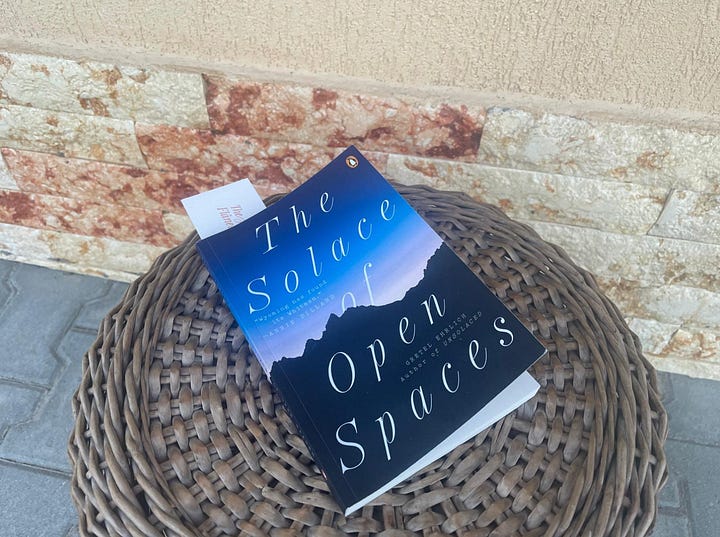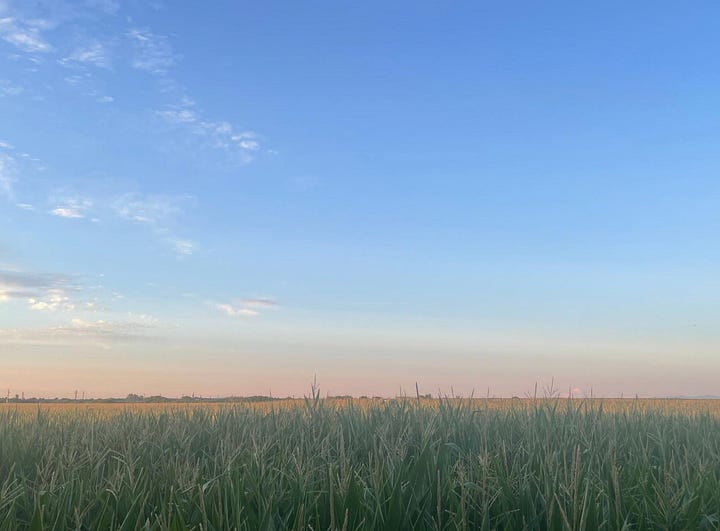Open Space
“In all this open space, values crystalize quickly.” - Gretel Ehrlich
I’ve been reading The Solace of Open Spaces over the past few days, Gretel Ehrlich’s collection of lyrical essays about life in rural Wyoming in the late 1970s and early ’80s. Originally written as journal entries to a friend, the book traces a personal journey shaped by grief, renewal, and a deep immersion in an austere yet vividly alive landscape. All while I’ve been spending a quiet week in the Romanian countryside.
One sentence stuck with me as I was rereading it, looking out at the cornfields we own, attached to our countryside home: “In all this open space, values crystalize quickly.”
The more I read, the more I realised how closely Wyoming resembles the open spaces of the Romanian countryside, the abandoned homes in villages, the farms left in quiet disarray, and the quiet endurance of the people who choose to stay.
“There’s so little to do except work that people wind up in a state of idle agitation that becomes fatalistic, as if there were nothing to be done about all this untapped energy. So the dark side to the grandeur of these spaces is the small-mindedness that seals people in. […] Cabin fever explodes into suicides, or into grudges and lifelong family feuds.”
Beyond this aspect of untapped energy, which I find most compelling, open spaces also hold a deep capacity for honesty. They expose the unnecessary, the parts that shouldn’t be there, and reveal things that we’d rather keep sheltered.
The beautiful thing about human experience is our capacity to hold a wide range of emotions and feelings at once. In these open spaces, despite their vastness, emotions don’t dilute. There’s an overwhelming clarity and sharpness in holding so many conflicting feelings at once.
And so I’ve been thinking more and more this week about writing, and the recent conversations and experiences I’ve had around it. Writing has felt, and still feels at times, like an open, raw nerve along the spine: persistent, exposed, jolting at even the lightest touch.
I believe that, as writers, we welcome authenticity more than most things. We crave the nakedness of honest observations, whether they bring comfort or discomfort. And because we write from that place, any hopeful or joyful feedback on work that feels deeply personal can feel like a raised hand in recognition, after years of looking out at empty seats.
But if that feedback, that kind acknowledgment, is only a disguise for something else, something unrelated to the writing, the ideas, or the values we hold in common, then it compromises the honesty of thought we value so deeply. And if that feedback becomes an excuse to fulfil one’s own unmet needs, a way of performing honesty and closeness, it feels even more violating.
It feels only reasonable, after something like this, to retract, regroup, and momentarily lose hope for a real encounter. And maybe that’s a sane decision, a protective skin that shelters all the other raw nerves through which we take in the world. A way to moderate, reduce, even temporarily numb inputs.
And yet, I hope that even after such ruptures, after these momentary lapses in connection and trust, we persist. That we continue to be honestly jolted by what we see, and what we feel compelled to share.
It’s my last night here, in a place so remote that even Apple Weather can’t pin it down, and I’ve noticed something that brings an unexpected sense of comfort.
After every long day of sun-scorched air, a storm would pass through in the middle of the night, waking me around two or three. The sky lit up with endless flashes of lightning, and strong gusts of wind swept through, clearing everything that felt heavy or unnecessary. Few things feel as hopeful and comforting as a moody summer storm in an open space.


Thank you for reading. As always, I welcome your stories. If you’re in Edinburgh at the end of August, I’m hosting a small gathering, you can RSVP here.
Patricia


